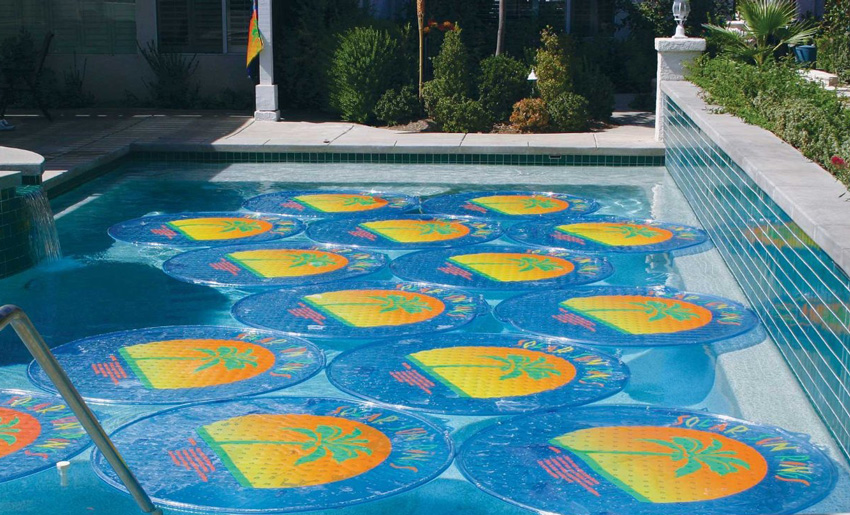The summer doesn’t last all year round and sooner or later those colder months are approaching so what do you do? This doesn’t mean you should throw away your swimming clothes and spend all your time indoors, instead, add a heater to your pool so you can swim all year round.
Now you might be thinking “aren’t pool heaters expensive?” but this is a common misconception amongst pool owners. Advancing technology has gotten to a point where everybody has access to a pool heating element now matter your price range. Here are a few different available methods you can use to keep your pool warm with options ranging from automatic to environmentally friendly.
Classic pool covers
Pool covers are a thin(or thick) sheet of material that is commonly found rolled up or laying on the surface of a pool. This sheet although simple in design is actually very competent at both storing heat in and keeping debris out. A double whammy of an effective product. However, there are multiple types allowing you to choose a design that best suits your pool.
Manual/Automatic pool covers
Probably the most well-known design out of the pool covers, manual/automatic basic pool covers provide you with a strong liner sheet that is fully capable of keeping the heat in during those cold days. This option is relatively cheap especially compared with options shown later on.
Solar pool covers
The solar pool cover is a thin version of the manual pool cover. This variant stores air bubbles within the thin lining creating a less durable but much more affordable pool cover. Normally they do not come with rollers for an easy retraction but you can install one for an added cost.
Powered Pool Heaters
Breaking off from the pool cover category comes a variety of effective pool heating machinery. These can include pool heating pumps, solar designs and heat pumps.
Solar Pool heating
Solar heating has gained traction for being a great way to heat your pool with no ongoing costs. Some of its best features are its environmentally friendly design and the affordability it shows compared to others in the powered heater list. It is slower to get to a warm temperature than others but considering you can have this running every day without any worries I’d say it’s worth it. If you can afford the initial payment and really care about the safety of the environment then this is an amazing choice.
Gas pool heater
If you want your pool warm fast then there is no better heater than a gas variant. As the name implies this is a gas-powered heater and is one of the go-to options for most pool owners. Even though the cost to run might be slightly higher, the strength is unparalleled. If you often don’t find yourself with much free time or don’t swim frequently then having an easy option to quickly heat up your pool is an absolute delight.
Heat pump
Economical and efficient, heat pump based pool heaters are something else. Through the use of an innovative design, this piece of technology is great at getting your pool warm for a low cost. This machine takes the heat from the air and slowly transfers that to your pool. This means that it does take a bit longer than gas heaters to heat up but once caught-up can easily keep the heat consistent.
Do these heaters work on every type/size of pool?
Do all of these heaters work on every type of pool? The answer is a little complicated. What is meant by this is that the size of the pool matters and some designs aren’t really going to be able to be suitable for every option.
With size comes overall water quantity and raising such a large amount of water to higher than ambient temperature can be a significant task. The best thing you can do is consult a pool professional when choosing your preferred pool heating method and go off what they suggest. This might entail getting a specialised pool cover sheet designed for the shape of your pool or needing extra solar panels for strength if you go down that route.
Other methods to heat the pool
There are other methods of heating your pool but are a little less practical than before. Although unique, these methods might be an effective solution that fits what you wanted.
First on the list is an indoor pool. It’s obvious that the ambient air’s heat around your pool is its biggest factor. If you live somewhere windy or cold outside then this constant dropping ambient temperature will reflect on your pool’s warmth. An indoor pool nullifies this and also helps store heat more efficiently.
Another suggestion is something really unique, a liquid blanket. You read that right, a liquid blanket uses a liquid that’s a lower density than normal water to create a blanket. Great if you have an oddly shaped pool but also a hassle to clean-up or keep from evaporating.
We hope that you found these pool heating tips useful. Finding the appropriate one for your particular pool may take a little bit of an investment, but when you’ve found the perfect one you’ll be thanking yourself in the years to come!

